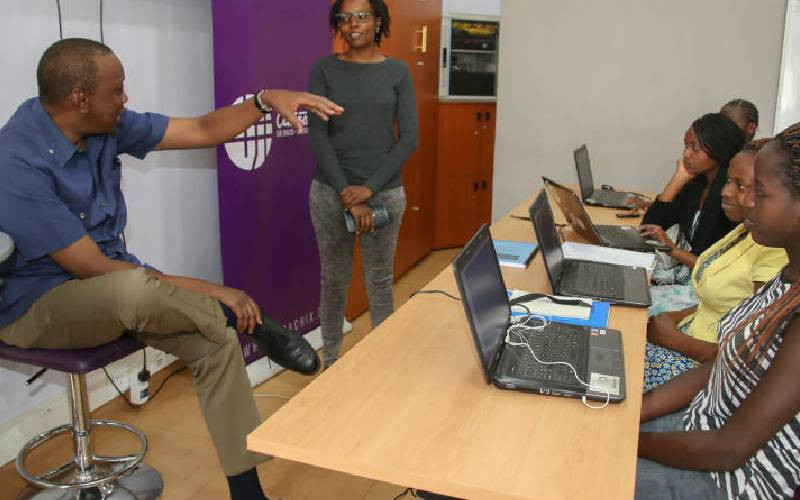
Several recent technology-based developments in Kenya have highlighted a challenge related to the glaring digital divide.
One current development is the registration of persons to the Social Health Authority (SHA). The registration process relies heavily on a USSD option to capture details from the applicants, given that the majority of Kenyans do not own an internet-enabled smartphone.
While the numbers from several authorities indicate a relatively high adoption of smartphones, the reality on the ground is proving otherwise. Today, the lack of a smartphone, particularly for vulnerable communities who also don’t have access to personal computers, means having to pay a very high price to access the internet and, to an extent, most of the e-government platforms.
I recently skimmed through the latest Communications Authority of Kenya Statistics Report. The report indicates good progress and confirms that the country’s telecommunications sub-sector experienced significant growth during the 2023-24 financial year. It attributed the growth to telecom infrastructure expansion and increased smartphone adoption.
The Sector Statistics Report for the period April to June 2024 indicates that the total number of mobile phone devices connected to mobile networks was 66.1 million, with a penetration rate of 128.3 per cent. The penetration rates for smartphones and feature phones were 68.3 and 59.9 per cent, respectively.
The report notes that feature phone acquisition dropped from 31,211,780 to 30,871,316 devices, while smartphone acquisition grew from 34,140,290 to 35,214,539 devices within the period under review.
However, on the ground, the situation is different as the average smartphone device cost ranges between Sh45,000 and Sh80,000.
While some middle-class to affluent Kenyans have access to multiple devices, millions (more than 20 million) are still encountering numerous barriers that limit their capacity to acquire mobile phones. According to the GSM Association, these barriers include policy issues such as high tax rates charged on devices and a lack of device financing options.
The GSM Association, in a report titled Driving Digital Transformation of the Economy in Kenya, projects that Kenya’s digital economy will contribute Sh662 billion to GDP by 2028. The report says this growth, driven by strategic policy reforms, will accelerate digitalisation in critical sectors such as agriculture, manufacturing, transport, and trade. It also forecasts the creation of 300,000 new jobs and increased tax revenues by Sh150 billion.
The reports note that despite Kenya’s extensive mobile coverage, smartphone adoption remains a barrier for many due to high costs and recommend policy measures such as tax reductions and expanding device financing options, which could help millions more Kenyans access mobile internet services by 2028. “Improving smartphone access would help close the internet usage gap and increase active mobile money accounts, driving greater financial inclusion,” the report says.
The CA and GSM Association reports aptly capture the fundamental realities we continue to experience in the Kenyan and Tanzanian markets. At Watu, one of our fastest-growing subsidiaries is our barely two-year-old Watu Simu business. Watu Simu provides affordable and convenient quality smartphone financing options to allow our clients to tap into the economic and social benefits that such devices provide.
Attesting to the growing demand for such financing options, Watu Simu celebrated its millionth customer in Kenya last month. In one of our recent business reviews, diving into the data sets also provided us with a stark insight: More than 70 per cent of our clients are involved in digital enterprises, including ride-hailing, online delivery and marketplaces, among other gigs that require smartphones for efficient operations.
We are enabling millions of Kenyans to contribute to nation-building by providing such device financing options.
The writer is the Kenya country manager at Watu
 The Standard Group Plc is a multi-media organization with investments in media
platforms spanning newspaper print operations, television, radio broadcasting,
digital and online services. The Standard Group is recognized as a leading
multi-media house in Kenya with a key influence in matters of national and
international interest.
The Standard Group Plc is a multi-media organization with investments in media
platforms spanning newspaper print operations, television, radio broadcasting,
digital and online services. The Standard Group is recognized as a leading
multi-media house in Kenya with a key influence in matters of national and
international interest.
 The Standard Group Plc is a multi-media organization with investments in media
platforms spanning newspaper print operations, television, radio broadcasting,
digital and online services. The Standard Group is recognized as a leading
multi-media house in Kenya with a key influence in matters of national and
international interest.
The Standard Group Plc is a multi-media organization with investments in media
platforms spanning newspaper print operations, television, radio broadcasting,
digital and online services. The Standard Group is recognized as a leading
multi-media house in Kenya with a key influence in matters of national and
international interest.











